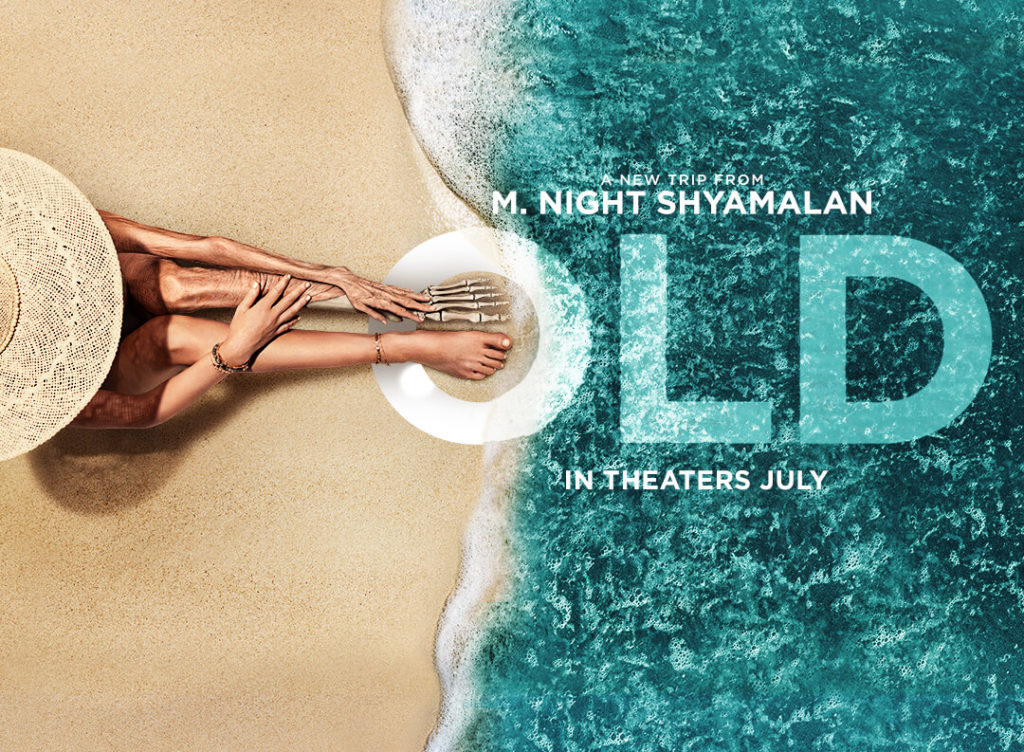
在这个大部分高概念恐怖片(高概念:high-concept,透过大型的预算、鲜明清晰的剧情结构以及不断行销宣传以及众多周边商品的推动,来造就票房的电影生产策略——译者注)及科幻电影纷纷转移到电视领域的时代(参见《黑镜》), 奈特·沙马兰(Night Shyamalan)在院线上映其最新电影的想法,让人感觉十分老派。
从表面上看,这部小电影看起来更属于像网飞(Netflix)这样的巨头流媒体平台会提供的内容:这也是当今大多数B级电影的归宿。
尽管如此,虽然不能完全将《老去》定义为低成本电影,但它明显低落的制作成本(1亿8千5百万美元),仍旧试图在大银幕观看这部影片时冲击我的神经。
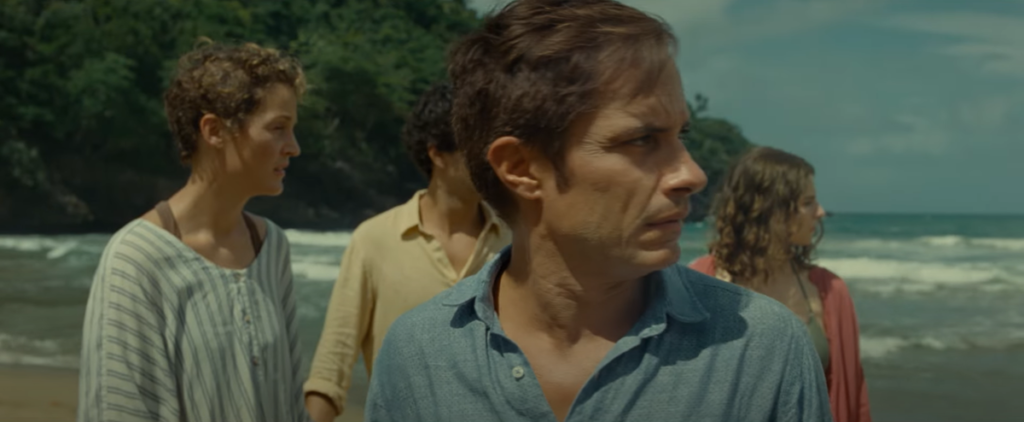
本片开场便聚焦于一个小家庭中的夫妻盖伊(Guy)和普丽丝卡(Prisca),夫妻二人分别由盖尔·加西亚·贝纳尔(Gael García Bernal)和薇姬·克里普斯(Vicky Krieps)饰演。两口子带着一双儿女,正“逃”往一个对一家人来说都宛如天堂的(paradisiac)地方。
在这里,“逃”的概念是很重要的,因为这对夫妇显然不幸福,他们为了子女极力维持情感,逃离家中的问题。说到这儿,我们并不清楚他们的貌合神离是由不忠、健康问题亦或是其他因素导致的。
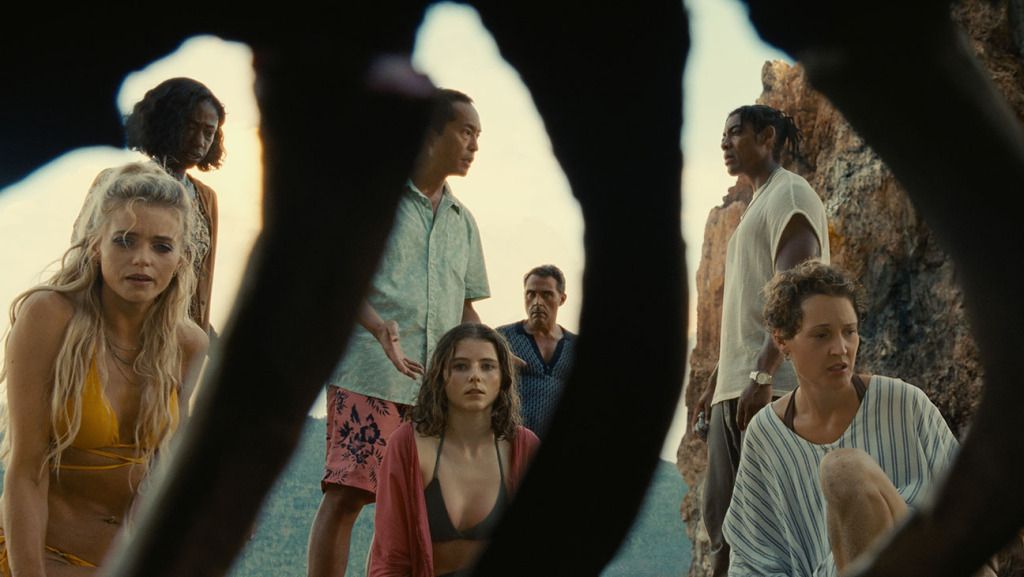
当他们到达了这个好到令人难以置信的度假胜地时(克里普斯此时贡献了片中众多无比生硬台词中的其中一句:“我简直不敢相信我在网上找到了这个地方!(I can’t believe I found this online!)”),我们开始结识片中其他角色,比如脸上带着电视主播般怪异微笑的酒店经理,以及其他完全符合刻板印象(stereotypepical)的度假者:外科医生和他的战利品般的老婆、年迈的母亲,以及一位癫痫女患者(好吧,最后一位比较不同寻常)。
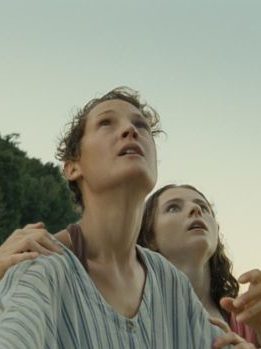
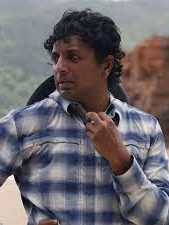
(Night Shyamalan)
沙马兰的风格实在很不寻常。片中的对白,简单来说,十分拙劣。电影中的有些画面很灵(inspired),有些却很怪异。例如片中有一处反复使用的拍摄手法:导演选择将角色和人脸框在镜头的外侧边缘,借此让观众的目光聚焦在天空或地平线上;仿佛镜头突然分了神,专注于主要角色之外的、其他不重要的地方。虽然观众很难知道这种手法是否是有意为之,但毫无疑问,此拍摄手法在影片一开始就给人以不适。当片中的一行人抵达某个特殊的海滩时(“只开放给部分客人”,诡异的经理是这么说的),观众已经感觉到十分不对劲了。而带领众人前往海滩的角色不是别人,正是由导演沙马兰本人饰演的,这也是他饰演过的最好的角色之一。
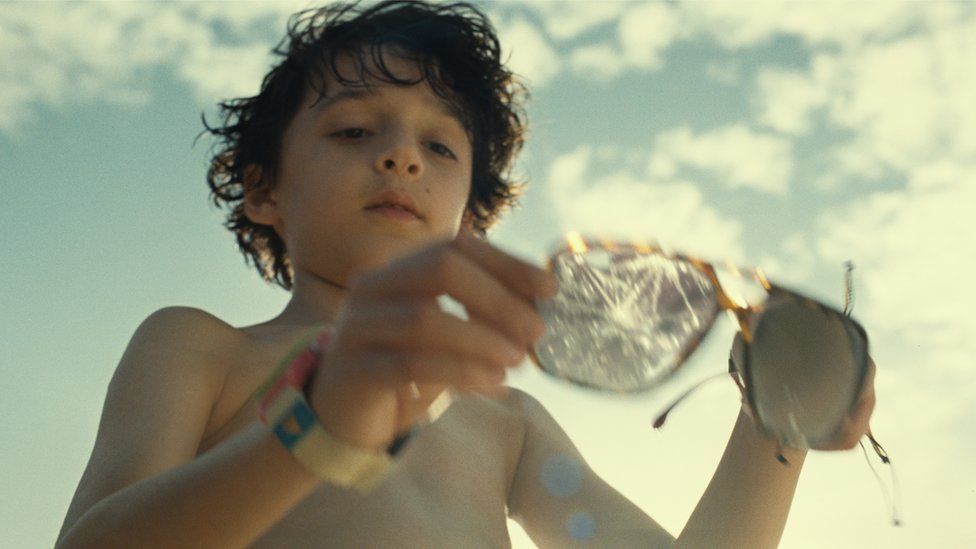
当盖伊、普丽丝卡和他们的孩子以及其他被选中的夫妻和几口之家抵达偏远的海滩时,情况发生了变化。的确,那儿碧海白沙,但众人必须穿过一处陡峭的峡谷才能抵达。海滩被锯齿般的悬崖峭壁围绕着,这在视觉上给人以压迫感。即使众人只打算在海滩上逗留几个小时,导演沙马兰饰演的司机却坚持让大家带足干粮。海滩上也没有信号。一开始,一切正常,但是棋子们已经就位,作为观众,你能感到事态不妙。
接下来是影片的核心部分。 在不过多剧透的情况下,可以总结如下:所有角色都开始加速衰老。年长者首当其冲,例如外科医生的母亲;孩子们则迅速地开始成熟,留给他们的时间也最多。
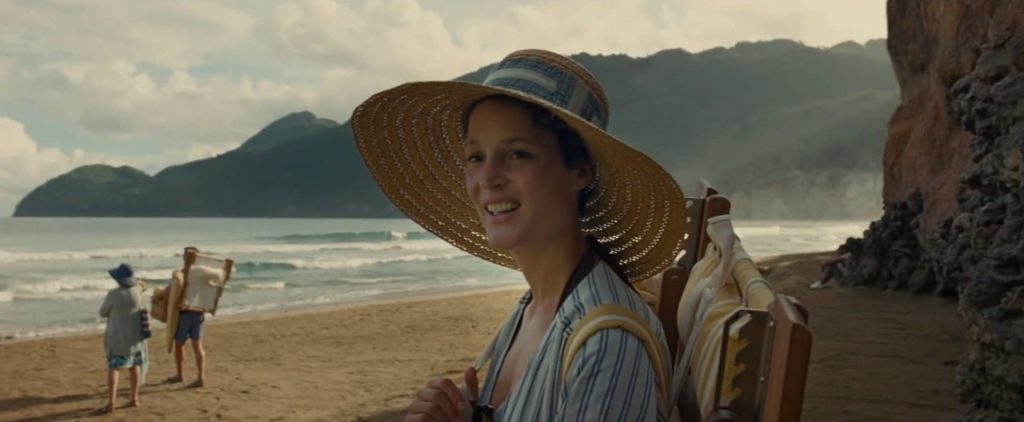
有趣的是,导演沙马兰并不确定这些意味什么。起初,影片的惊悚之处基于迅速衰老带来的生理变化(肿瘤迅速变大,青春期过早来临等),但当疾病变成一种隐喻,并开始对“真正的恐怖片”进行反思的时候,电影才变得有趣起来。这“真正的恐怖片”就是我们的真实生活:我们都在加速驶向向死亡,衰老来得比我们想像中更快。
随着夜幕降临在这个受诅咒的海滩上,导演试图将影片引导至正确的方向;并在刻画盖伊和普丽丝卡晚年时分的俩人关系中时,塑造了一系列激发同情(empathy)和悲悯(pathos)的真实瞬间。尽管对白宛如大学生习作,演员真实的演技将场景刻画得十分凄楚(poignant)。
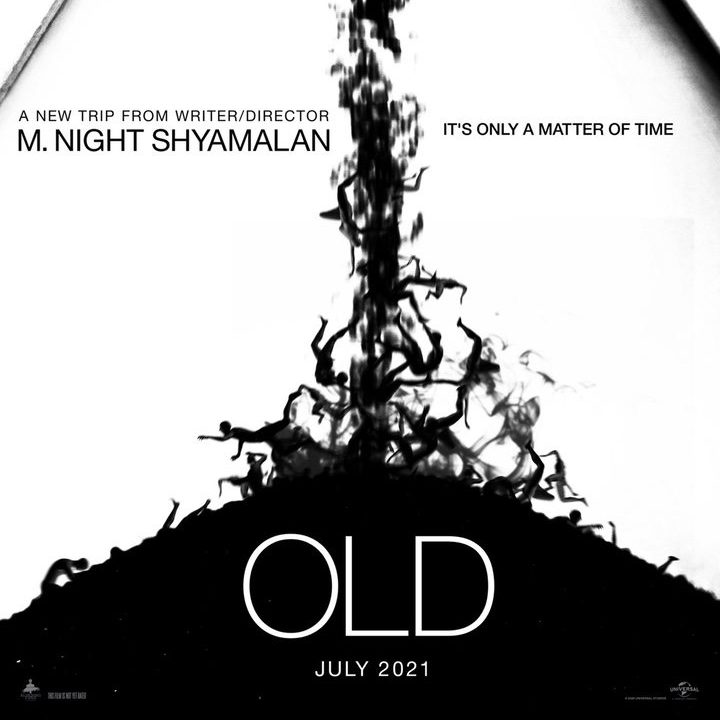
直到我看见导演通过镜头注视着海滩,也就是这个强大的窥视者注视着由他创造的生与死的缩影的这一幕时,我才完全了解《老去》想传达的意义。
奈特·沙马兰可能不是一个说故事大师(master storyteller),他当前也很可能被更现代的恐怖片导演(比如罗伯特·艾格斯Robert Eggers或阿里·艾斯特Ari Aster)所超越,因为后者们的电影肯定更有力量。不过面对早年得志和过高期望这两个对电影从业者来说最大的陷阱,沙马兰还是幸存下来。现在他回来了,他的制作成本更加低廉、电影制作更加谦虚,而且他并不只是一个“网飞导演”。在《老去》背后,有他真实的声音和匠心工艺(craft)。
結語
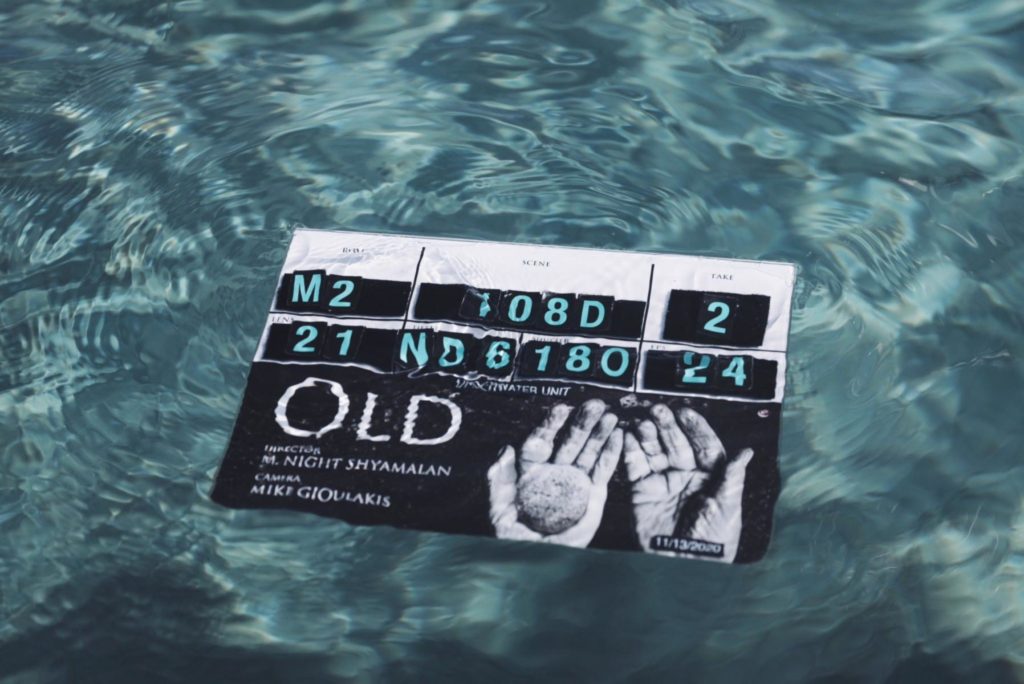
这部电影的设定本身是完美的:海滩是两个世界之间的边界。到达海滩,在某种程度上代表抵达终点,因为此时已没有其他地方可去。就像爬山可以被视为某种接近上帝的徒劳尝试,抵达海滩则可以被视为对界线(threshold)和死亡的接受。
离开海滩,游向大海,可以带来新的重生,但变化也随之而来。有时,能做的最好的事情是坐在海滩上,建造沙堡,望着夕阳西下。
影评人简介
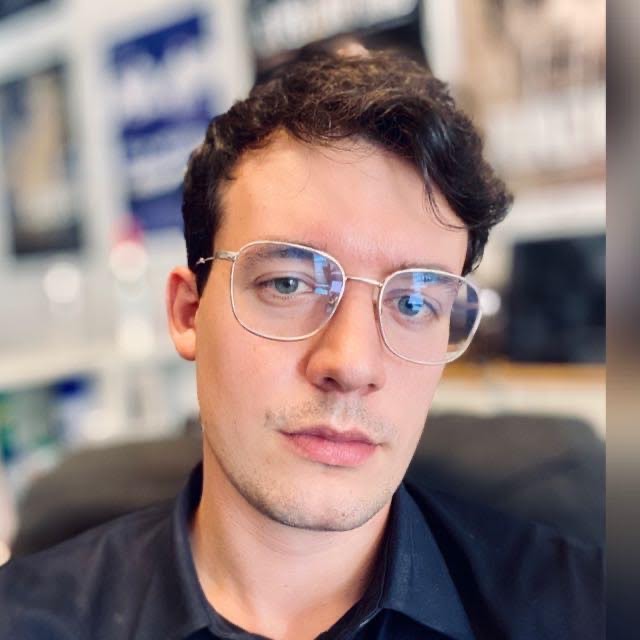
贝尔纳多·莱特(Bernardo Leyte),常驻巴黎的电影制作人。 他在西班牙、德国和英国长大,毕业于伦敦电影学院,目前担任导演。 他是一位充满热情的影迷,他所观看的电影囊括各种类型,从他的偶像斯坦利·库布里克(Stanley Kubrick)和安德烈·塔可夫斯基(Andrei Tarkovsky)的電影,到超级英雄、恐怖片、动漫等。
英文原文
In a time where high-concept horror and science-fiction ideas have mostly moved over to the realm of television (see:Black Mirror), the idea of a theatrical release for M. Night Shyamalan’s newest film, felt, well… old-fashioned. This is a small movie that, on the surface, looks like it belongs on the virtual shelves of a streaming supermarket such as Netflix, the living quarters for most genre B-movies movies of today.
However, the apparent slightness of Old doesn’t fully define a film that may be small and low budget (18.5 m USD), yes, but at the same managed to hit a nerve as I was viewing it on the big screen.
Gael García Bernal and Vicky Krieps are Guy and Prisca, the central couple of the nuclear family that Old opens with: they are a man and a woman, with their son and daughter in tow. They are all on their way to a paradisiac getaway for the whole family; the idea of “getaway” is important, as the clearly unhappy couple seems to be running from their problems back home and barely holding it together for the kids. It is unclear whether infidelity, health, or something else is driving them apart.
Once they get to the too-good-to-be-true resort (one of the many lines of stilted dialogue delivered by Krieps goes “I can’t believe I found this online!”), we get to know a cast of surrounding characters, from the uncanny TV-presenter smiles of the hotel management to the array of stereotypical holiday-goers: the surgeon and his trophy wife, the old mother, the woman with epilepsy-fits (ok, that last one is rather unusual).
Shyamalan’s style is, indeed, unusual. The dialogue is, simply put, bad. Some of the cinematography is inspired while other choices are strange; there is a recurrent stylistic device by which the director chooses to frame people and faces around the outer edges of the screen and keeps the viewer’s focus on the sky or the horizon, as if the camera was getting distracted and peering beyond the insignificance of the main characters. Though it is hard to know whether it is all intentional, it certainly contributes to the feeling of unease conveyed from the very opening of the film. Something already feels very wrong as the cast of characters is driven to a special beach (“for some guests only”, says the creepy manager) by none other than Shyamalan himself, in one of his better on-screen roles.
Things change when Guy, Prisca, their children and a few other selected couples and families arrive at the remote beach. True, the sand is white and the water is turquoise, but they must go through a sharp canyon to get to it, and the high, jagged cliffs which surround it make it visually oppressive. The van driver played by Shyamalan insists that they take an inordinate amount of food supplies, even though they’re going to stay only for a few hours. There is no phone reception. Nothing bad happens at first, but the pieces are on the chessboard and, as a viewer, you can sense a trap.
What follows is the core of the film; without spoiling more than the overall premise, suffice it to say that all of the characters start experiencing highly accelerated ageing. Older people such as the surgeon’s mother are the first in line, while the children, advancing quickly towards maturity, seem destined to last the longest.
Interestingly, Shyamalan doesn’t seem to be sure what any of it means; at first, Old’s thrills are based on the physical effects of ageing too rapidly (tumours growing too quickly or puberty hitting too fast), but when the film really gets interesting is when the malady becomes metaphor and starts to reflect on the real horror film we all live in as human beings: we are all hurtling towards death at an accelerated rate, getting old faster than we would like. As day turns to night on the cursed beach, the director manages to hit the right notes and extricate real moments of empathy and pathos out of the relationship between Guy and Prisca, as their union also nears its twilight. The student movie dialogue gives way to a handful of poignant scenes with real acting. By the time I saw the director looking at the beach through a camera lens, an all powerful voyeur watching over the microcosm of life and death he himself created, I was fully onboard with Old.
M. Night Shyamalan may not be a master storyteller, and he may currently be eclipsed by more modern horror directors such as Robert Eggers or Ari Aster, whose films are certainly more muscular, but he survived one of the biggest traps a filmmaker can be thrown into; early success and sky-high expectations. Now that he is back, his filmmaking is cheaper and more humble, but he’s no “Netflix director”. There is a real voice behind Old, and real craft. The setting of the film itself is brilliant: a beach is a frontier between worlds. Going to the beach means, to some extent, reaching the end, as there is nowhere else to go. Just like climbing a mountain could be seen as a futile attempt at getting closer to one’s god, going to the beach is an acceptance of the threshold, of mortality. Swimming out to sea could bring about a new rebirth, but with it comes change nonetheless. Sometimes, the best thing to do is sit down, build a sandcastle, and watch the sun set.

